-
-
FeaturesคุณสมบัติPenyelesaianRecursosFiturCaracterísticas精选功能功能特點المزايا
-
Solutionsโซลูชั่นPenyelesaianSoluçõesSolusiSoluciones解决方案解決方案الحلول
-
IntegrationsการผสานรวมIntegrasiIntegraçõesIntegrationsIntegraciones集成整合服務دمج مع تطبيقات أخرى
-
Affiliate/Partnersพันธมิตร/พันธมิตรทรัพยากรAfiliasi/Rakan KongsiAfiliados/ParceirosAfiliasi/MitraAfiliados/Partners联盟/合作伙伴聯盟/合作夥伴شريك
-
ResourcesจองการสาธิตSumberRecursosSumber dayaRecursosالموارد資源中心
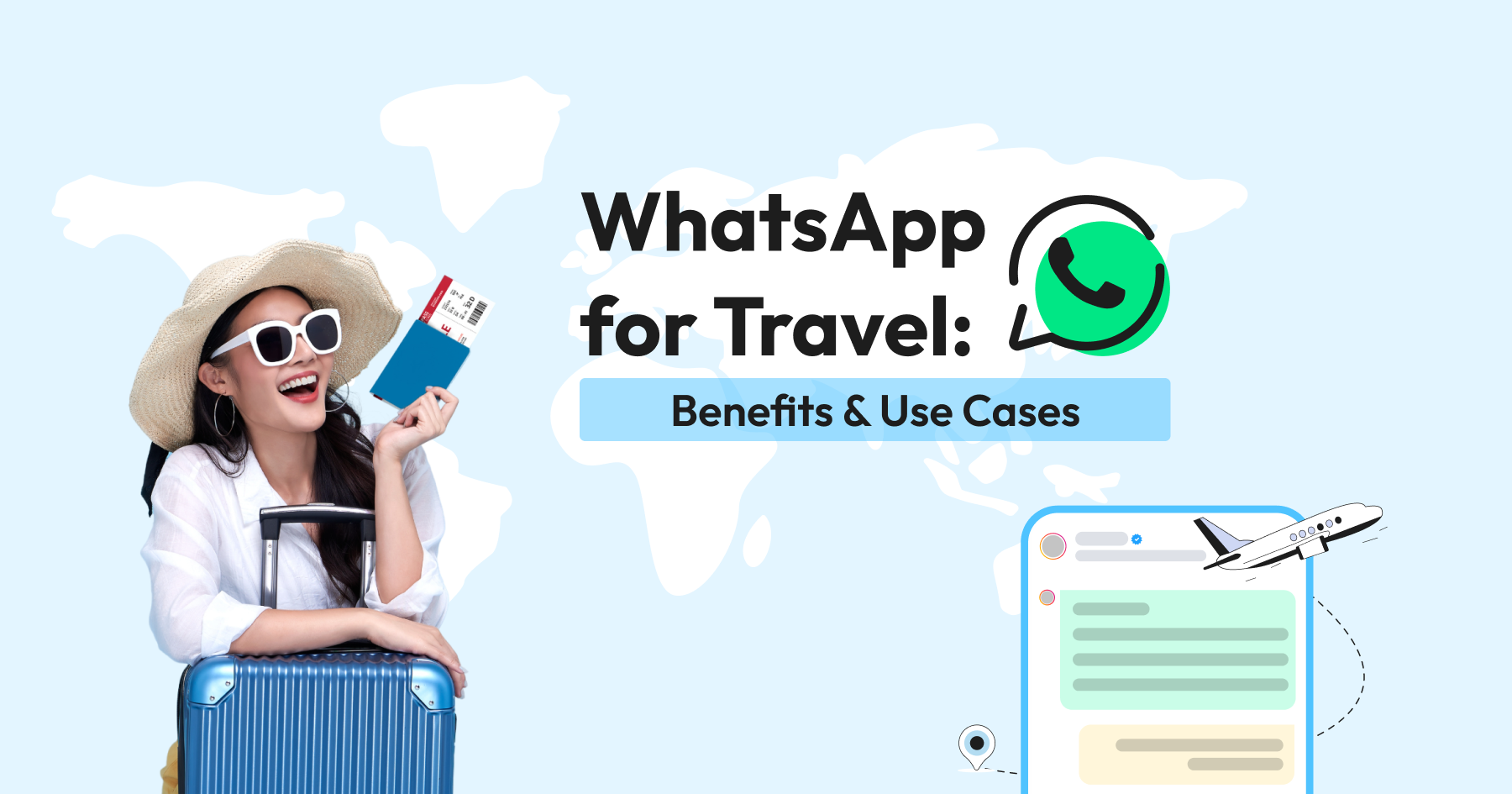
WhatsApp for Travel: Benefits & Use Cases in 2025
WhatsApp for travel, the first thing that comes to my mind when I think of this phrase is the happiness you feel while creating a group on WhatsApp to plan your upcoming trip. Although, in many cases, those trips never see the day of light and only remain on WhatsApp 🥲
In a way, WhatsApp is a graveyard of thousands of cancelled planned trips. But I guess that has more to do with the people than the platform.
Also, WhatsApp isn’t just limited to creating groups for discussing trip plans. It’s much more than that. Today, with the rise of WhatsApp Business API, WhatsApp is the most preferred platform for not only travelers but also for travel agencies. In this blog we’ll deep dive into every aspect of WhatsApp for travel starting from benefits and then later discussing the different use cases.
Benefits of WhatsApp for Travelers
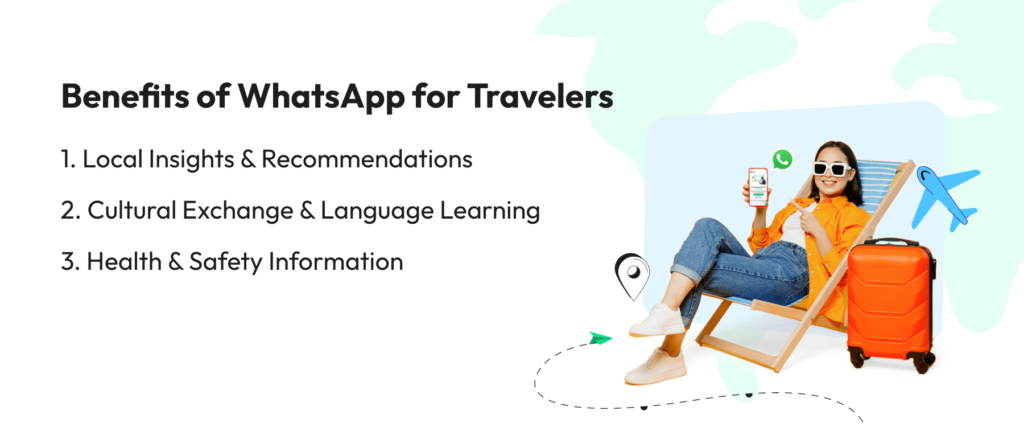
1. Local Insights & Recommendations
WhatsApp provides travelers with direct access to local residents or experts who can offer personalized recommendations and insights about their destinations. By joining local community groups or connecting with knowledgeable individuals through WhatsApp, travelers can discover hidden gems, off-the-beaten-path attractions, and authentic experiences that may not be found in guidebooks or mainstream travel websites.
This direct line of communication with locals enhances the cultural immersion and authenticity of the travel experience, allowing travelers to explore destinations like a true insider.
2. Cultural Exchange & Language Learning
WhatsApp facilitates cross-cultural communication and language learning opportunities for travelers seeking to engage with locals and immerse themselves in the cultural fabric of their destination.
Through language exchange groups, conversation partners, or cultural exchange networks on WhatsApp, travelers can practice:
- Speaking the local language
- Learn about customs and traditions
- Forge meaningful connections with residents from diverse backgrounds
3. Health & Safety Information
Travelers can access important health and safety information through WhatsApp, including:
- Updates on vaccination requirements
- Travel advisories
- Medical resources
By subscribing to official health channels or connecting with healthcare professionals on WhatsApp, travelers can stay informed about potential health risks and precautions to take during their travels.
4 Benefits of WhatsApp for Travel Agencies
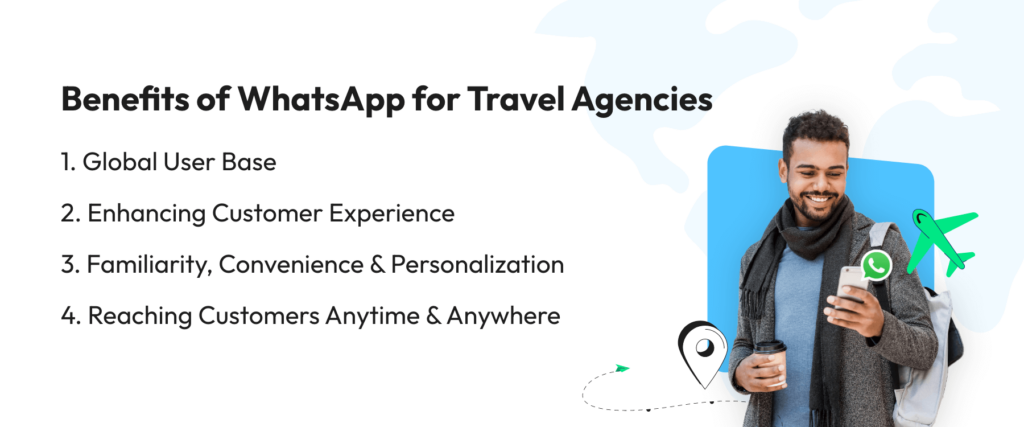
1. Reaching Customers Anytime and Anywhere
One of the key benefits of using WhatsApp Business API is the ability to reach customers anytime and anywhere. With the widespread use of smartphones and the popularity of WhatsApp, travel companies can easily connect with their customers on a platform they are already familiar with.
Whether it’s sending booking confirmations, providing real-time updates, or offering customer support, WhatsApp enables businesses to communicate with their customers in a timely and efficient manner.
2. Familiarity, Convenience, and Personalization
WhatsApp’s large user base and end-to-end encryption for secure communication make it a trusted platform for users around the world. Additionally, WhatsApp offers automation capabilities through chatbots, allowing travel companies to personalize interactions with their customers.
From recommending personalized travel itineraries to answering frequently asked questions, WhatsApp enables businesses to provide a convenient and personalized experience for their customers.
Also Read: Understanding WhatsApp Security Features: A Comprehensive Overview
3. Utilizing WhatsApp’s Global User Base
With over 2.8 billion users worldwide, WhatsApp provides travel companies with a vast potential customer base. Online Travel Agencies (OTAs) can leverage WhatsApp to offer travel alerts, seamless payments, personalized recommendations, and concierge services. By utilizing WhatsApp’s global reach, travel companies can tap into new markets and expand their customer base.
4. Enhancing Customer Experience
By using WhatsApp Business API, travel companies can enhance the overall customer experience and build trust and loyalty. Real-time communication, personalized interactions, and convenient services offered through WhatsApp create a positive experience for travelers.
Whether it’s sharing boarding passes, handling complaints and refunds, or collecting feedback, WhatsApp enables businesses to provide efficient and effective customer service. This, in turn, fosters trust and loyalty among customers.
WhatsApp for Travel: 4 Use Cases for Travelers

1. Group Trip Planning and Coordination
Group travel often involves a lot of planning and coordination among travelers. WhatsApp makes it easy by providing a platform for seamless communication and collaboration.
Through WhatsApp, travelers can create dedicated group chats for discussing:
- Itinerary planning
- Accommodation options
- Transportation arrangements
- Budgeting and expenses
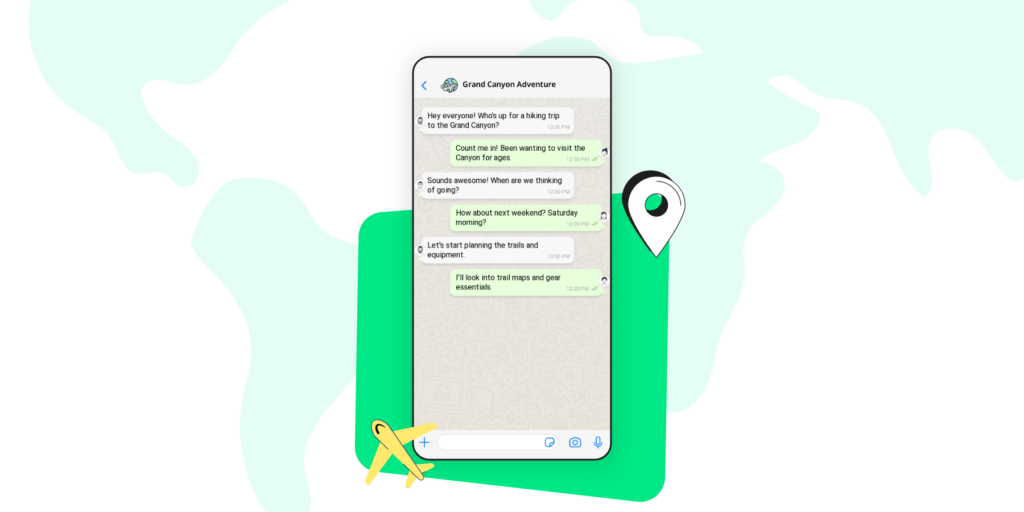
For example, let’s consider a group of friends organizing a hiking trip to the Grand Canyon. Through a WhatsApp group chat, they share trail maps, discuss equipment requirements, and finalize meeting points, ensuring everyone is on the same page and maximizing the enjoyment of their adventure.
2. Sharing Location and Meeting Points
Navigating through unfamiliar streets and landmarks during travels can be challenging, especially when trying to meet up with friends or fellow travelers. But fear not! WhatsApp’s location-sharing feature is here to save the day by making coordination a breeze.
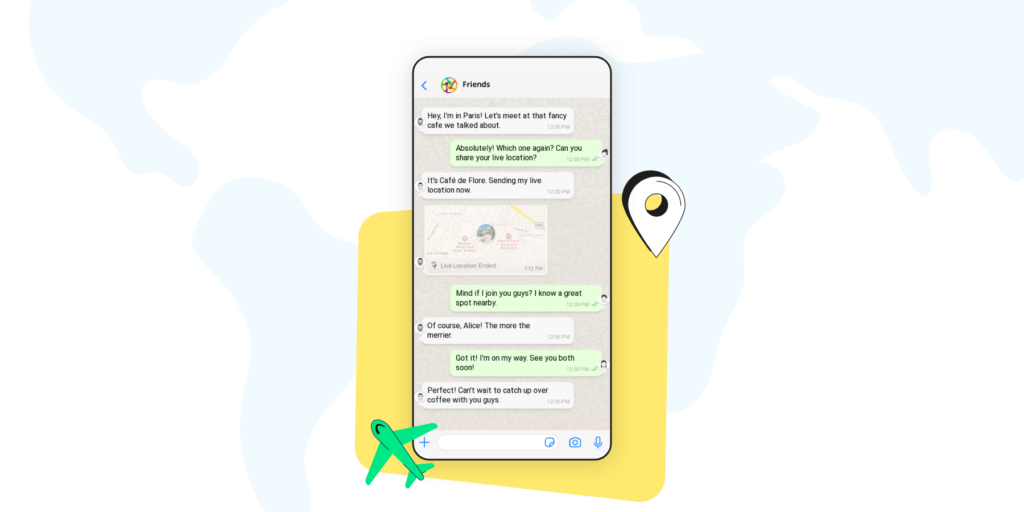
Picture this, you are in Paris, eager to meet your friend at a fancy cafe. With just a few taps on your phone, you share your live location via WhatsApp. Meanwhile, your friend, armed with this precise information, effortlessly weaves through the vibrant streets and bustling crowds, to reach that cafe.
3. Accessing Travel Updates & Alerts
Staying informed about travel-related updates and alerts is crucial for a smooth and hassle-free journey. WhatsApp offers a convenient platform for travelers to subscribe to relevant channels or newsletters that provide timely information such as flight delays, weather forecasts, or local advisories. This real-time access to updates ensures travelers can adapt their plans accordingly and mitigate potential disruptions.
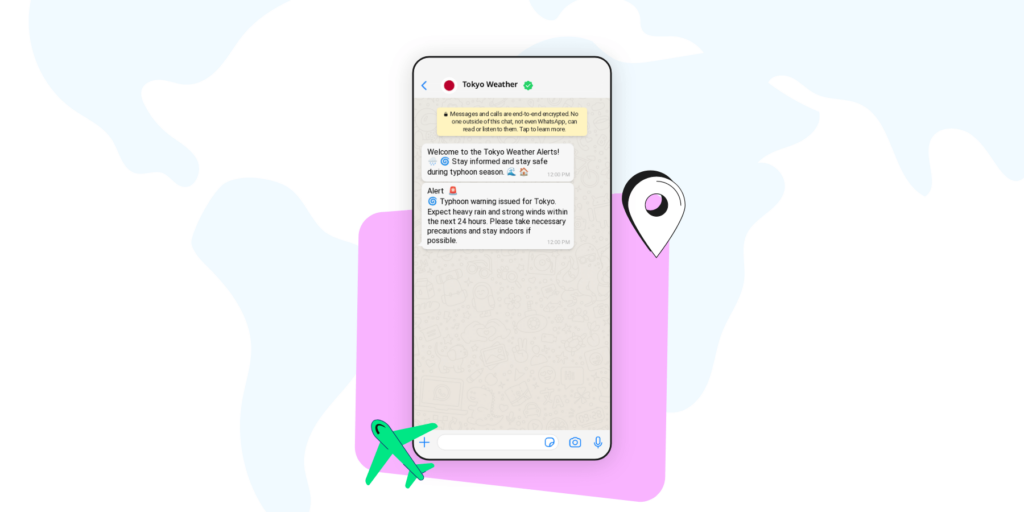
Let’s understand this with an example. Take the case of Jack, who is on a business trip in Tokyo during typhoon season. By subscribing to a WhatsApp newsletter for weather alerts, he receives instant notifications about an approaching storm, allowing him to reschedule his meetings and make necessary preparations to ensure his safety.
4. Sharing Travel & Itinerary Documents
Keeping track of travel itineraries, booking confirmations, and important documents can be difficult while on the go. WhatsApp simplifies this process by allowing travelers to share documents directly within chats, eliminating the need for separate emails or messaging apps and providing a centralized platform for all travel-related information.
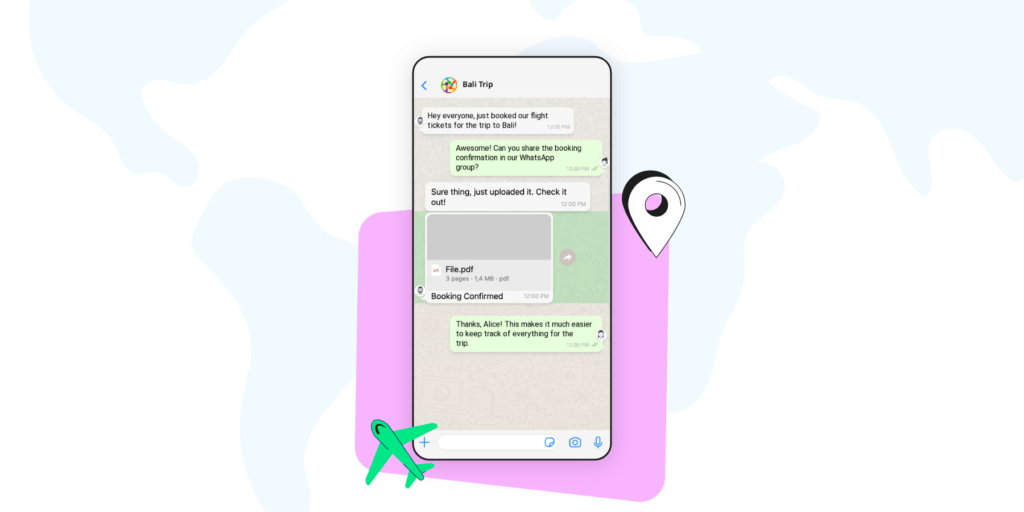
This feature streamlines the travel planning process, enhances communication among travel companions, and ensures that everyone remains well-informed and prepared throughout their journey.
WhatsApp for Travel: 6 Use Cases for Travel Agencies
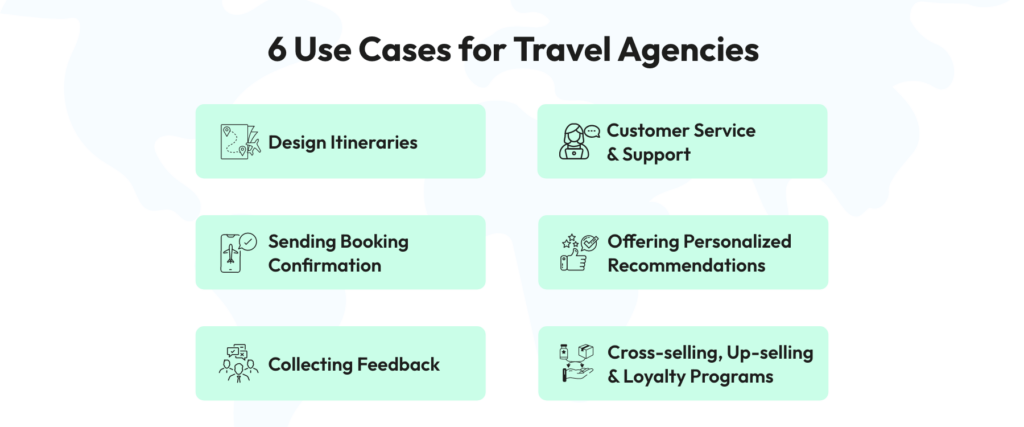
1. Design Itineraries
WhatsApp chatbots can be programmed to interact with travelers, gather information about their preferences, budget, travel dates, and destination interests. Based on this data, the chatbot can suggest personalized itineraries, recommend activities, attractions, and accommodations, and even make bookings or reservations directly within the chat.
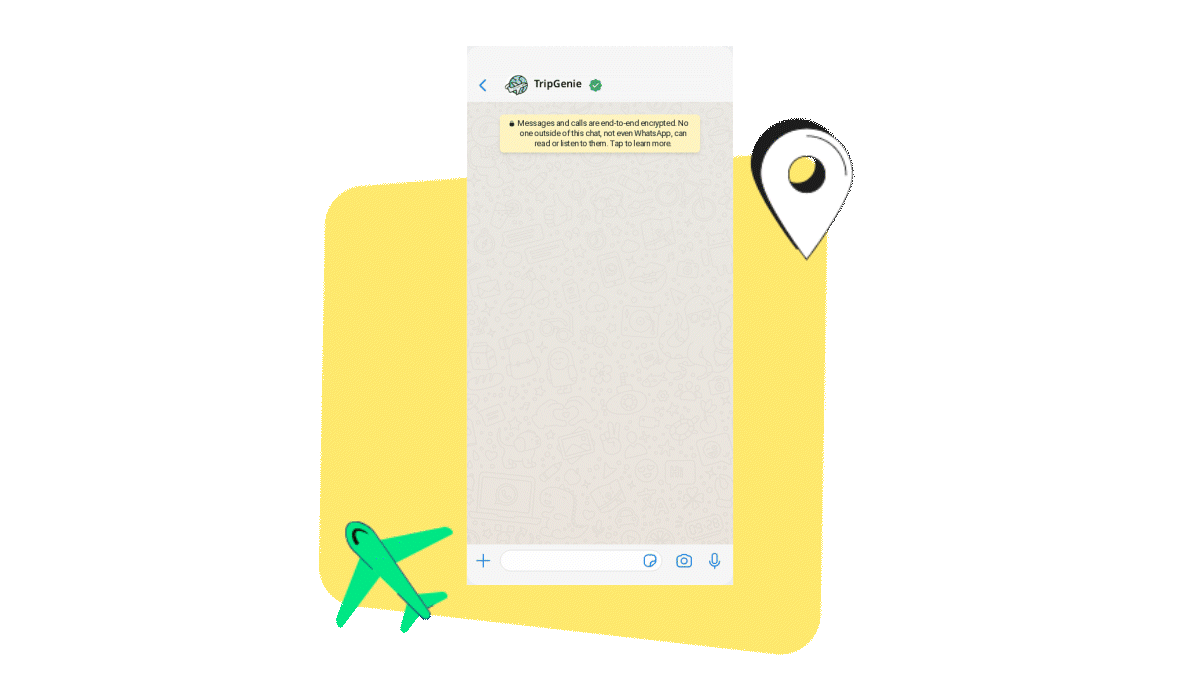
Let’s see how exactly a WhatsApp chatbot achieves this.
1. Information Gathering
The chatbot starts by asking the traveler a series of questions to understand their preferences, such as preferred destinations, travel dates, activities of interest, and budget constraints.
2. Customized Recommendations
Using the information gathered, the chatbot generates personalized itinerary suggestions. It suggests places to visit, activities to partake in, and accommodations to stay at, tailored to the traveler’s preferences and constraints.
3. Iterative Refinement
Based on the traveler’s feedback on the initial recommendations, the chatbot refines the itinerary further. It may suggest alternative options or adjust existing recommendations to better align with the traveler’s preferences.
4. Real-time Assistance
Throughout the itinerary design process, the chatbot provides real-time assistance by answering questions, offering additional information, and making adjustments to the itinerary as requested by the traveler.
5. Finalization
Once the traveler is satisfied with the itinerary, the chatbot can provide a finalized version for their reference. It may also include additional details such as maps, contact information, and booking instructions.
2. Customer Service & Support
Travel agencies can use WhatsApp for holistic customer service and support. The customer support team can use WhatsApp to engage with clients, offering:
- Real-time assistance
- Itinerary updates
- Personalized recommendations
They can also promptly address inquiries, manage bookings, and resolve issues directly through text, voice messages, or file sharing.
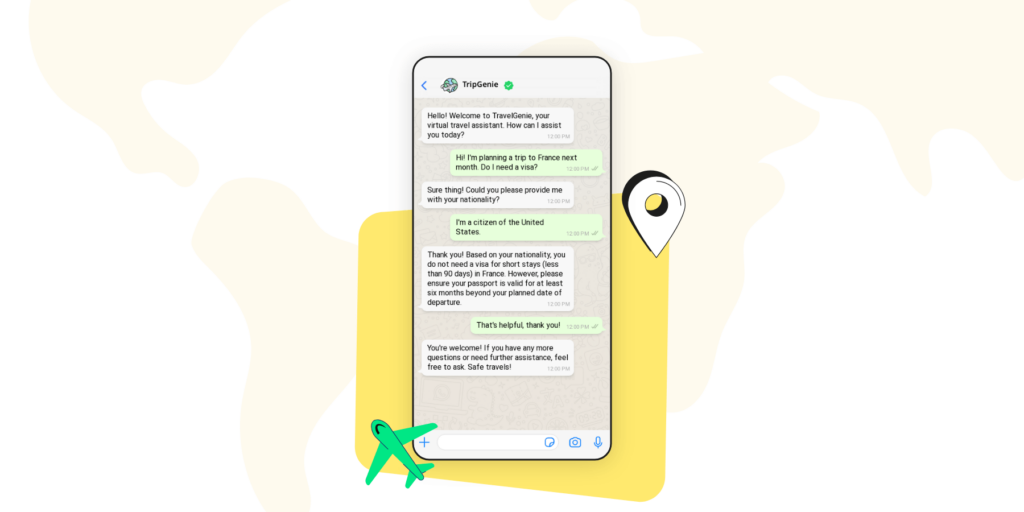
Although, that’s not the only way a travel agency can use WhatsApp for customer support. They can also integrate a WhatsApp chatbot that can handle common queries:
- Booking procedures
- Visa requirements
- Travel policies
These chatbots instantly provide relevant information round the clock, relieving the support team of repetitive tasks.
3. Sending Booking Confirmations & Reminders
Travel agencies can use WhatsApp to send booking confirmations and reminders efficiently. After a booking is made, agents can instantly send a confirmation message via WhatsApp, including details like:
- Travel dates
- Flight numbers
- Accommodation information
- Payment receipts
This ensures that customers have immediate access to their booking details and reduces the risk of miscommunication.
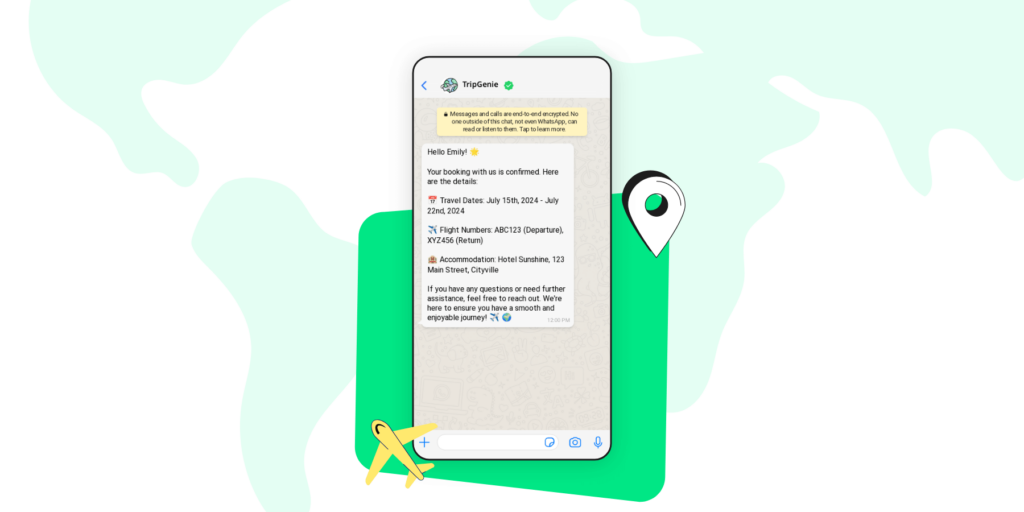
Additionally, agencies can schedule automated reminders closer to the travel dates, prompting customers to prepare for their trip, complete any pending tasks like visa applications, or check-in online. These reminders can be personalized based on the customer’s itinerary and preferences, optimizing engagement and enhancing the overall travel experience.
Also Read: Guide to WhatsApp API for Hospitality Sector (2025)
4. Offering Personalized Recommendations & Deals
Travel agencies can use customer data to offer personalized recommendations and deals via WhatsApp. Let’s see how.
a. Gathering Customer Information
Firstly, they can gather information about customers’ travel preferences, past bookings, and interests. This data enables them to tailor recommendations to suit individual preferences, suggesting destinations, accommodations, activities, and tours that align with the customer’s travel style.
b. Personalized Recommendations via WhatsApp
Secondly, agents can use WhatsApp to engage in one-on-one conversations with customers to understand their specific needs and preferences better. They can then send personalized recommendations directly to the customer’s WhatsApp inbox, along with exclusive deals, discounts, and promotions based on their profile and previous interactions.
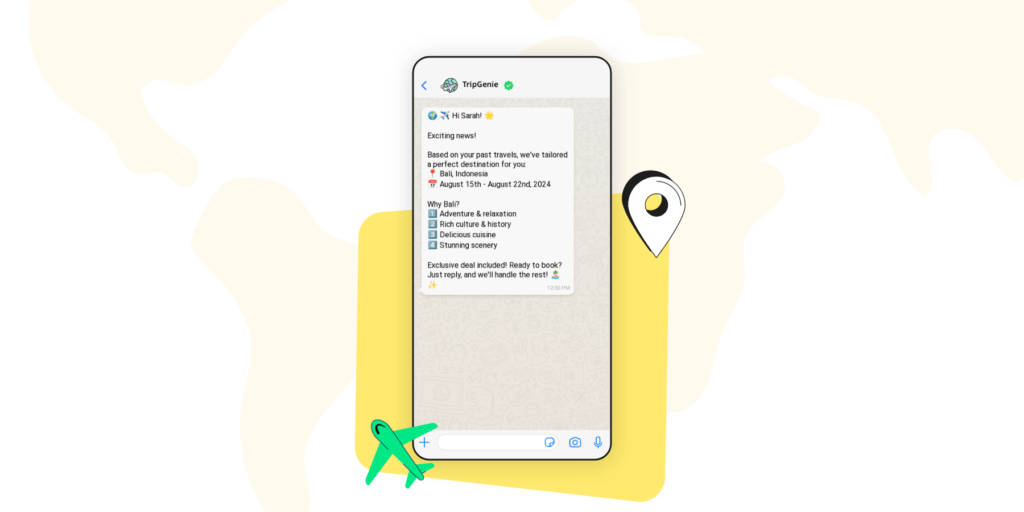
c. Targeted Engagement Through Broadcast
Travel agencies can use WhatsApp’s broadcast feature to send targeted messages to specific customer segments, such as frequent travelers or those interested in specific destinations. By delivering relevant content and offers directly to customers’ smartphones, agencies can enhance engagement, foster customer loyalty, and increase sales.
This personalized approach through WhatsApp creates a more tailored and engaging experience for customers, driving customer satisfaction and loyalty.
5. Collecting Feedback and Reviews
Travel agencies can leverage WhatsApp to collect feedback and reviews from customers in a convenient and interactive manner. After the completion of a trip or service, agencies can initiate a conversation with customers on WhatsApp, thanking them for choosing their services and asking for feedback.
They can provide a simple feedback form or questionnaire within the WhatsApp chat, allowing customers to rate their experience and provide comments directly.
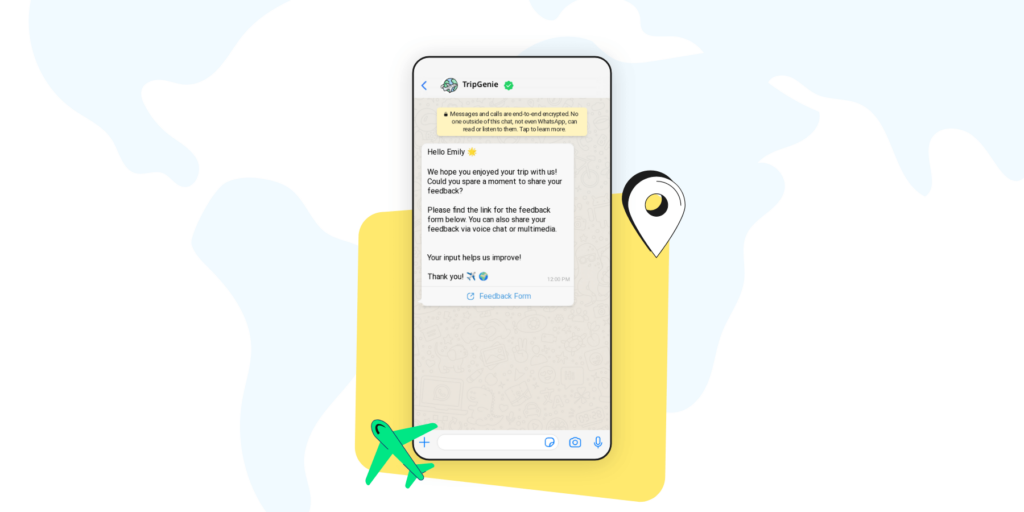
Additionally, agencies can encourage customers to share their feedback through voice messages or multimedia, facilitating more detailed and expressive responses. To incentivize participation, agencies can offer discounts or special offers for completing the feedback process.
Agencies can also use WhatsApp’s broadcast feature to send periodic requests for reviews to their customer base, ensuring continuous feedback collection.
6. Cross-selling, Up-selling, and Loyalty Programs
WhatsApp offers opportunities for cross-selling, up-selling, and implementing loyalty programs in the travel industry.
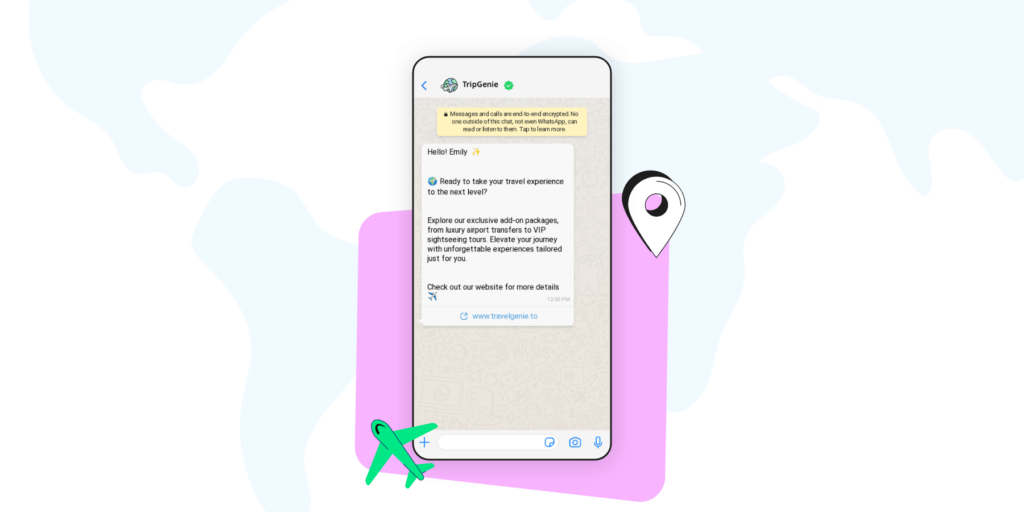
Travel businesses can promote additional services or upgrades to enhance the travel experience. By engaging customers through WhatsApp, companies can build stronger relationships, increase customer loyalty, and encourage repeat bookings.
Unlock the Full Potential of WhatsApp for Travel Agencies with Wati
If done right, travel agencies can leverage WhatsApp to a great extent. Although, to make the most of it, they need to choose a robust WhatsApp Business service provider. And when it comes to that, you don’t need to look further than Wati.
Below we have mentioned some features that make Wati a must have for all travel agencies.
- WhatsApp Chatbot: – Travel agencies can automate customer interactions, provide personalized recommendations, handle FAQs, and assist with bookings.
- Broadcast Messages: – Travel agencies can send targeted broadcast messages to specific customer segments, promoting special offers, updates, and promotions.
- Shared Team Inbox: – Travel agencies can ensure seamless collaboration among team members, enabling them to manage customer inquiries, bookings, and support requests efficiently through Wati’s Shared Team Inbox feature.
- Custom Notifications: – Travel agencies can keep customers informed throughout their journey, providing timely updates on booking confirmations, itinerary changes, and travel alerts.
- Click-to-WhatsApp Ads: – Travel agencies can create Click-to-WhatsApp Ads to direct traffic to their WhatsApp chat for seamless communication and engagement. This feature enhances customer engagement, conversion rates, and ultimately, business growth, by facilitating direct interactions with potential customers.
This was just a sneak peek, why not see Wati live in action? You can do that by claiming your 7-day free trial. To know more, you can also book a 1:1 demo.
Frequently Asked Questions
1. Can WhatsApp be used for booking flights, hotels, or other travel services directly through the app?
While WhatsApp offers communication channels between travelers and travel agencies, it typically doesn’t facilitate direct booking of flights, hotels, or other travel services within the app itself. However, travel agencies can use WhatsApp to assist customers with booking inquiries, provide personalized recommendations, and facilitate bookings through other channels or platforms.
2. Are there any privacy or security concerns associated with using WhatsApp for travel-related communication and transactions?
While WhatsApp provides end-to-end encryption for secure communication, travelers should still exercise caution when sharing sensitive information such as credit card details or passport information. It’s advisable to verify the identity of the recipient and ensure the authenticity of any links or attachments shared via WhatsApp.
3. Can WhatsApp be used for emergency assistance or contacting local authorities while traveling abroad?
While WhatsApp offers a convenient platform for communication, it may not always be the most reliable option for emergency assistance or contacting local authorities, especially in urgent situations. Travelers should familiarize themselves with local emergency contact numbers and protocols in their destination country and utilize official channels for seeking assistance in emergencies.
4. Are there any limitations or restrictions on the use of WhatsApp in certain countries or regions?
While WhatsApp is widely used globally, there may be instances where access to the app is restricted or limited in certain countries or regions due to government regulations or censorship. Travelers should be aware of any such restrictions and consider alternative communication methods or messaging apps when traveling to these areas.
5. How can travelers ensure they receive timely and relevant updates from travel agencies through WhatsApp?
Travelers can ensure they receive timely and relevant updates from travel agencies by opting in to receive notifications, subscribing to relevant channels or newsletters, and adjusting their notification settings within the WhatsApp app. Additionally, travelers should ensure they have a stable internet connection and sufficient data coverage to receive updates while traveling.
Latest Comments